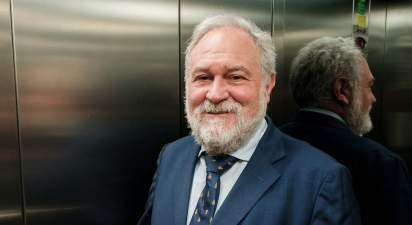
José Ignacio Zudaire highlights the unequivocal support provided by the CHM for the work of the BH2C, after being selected as one of the eight best examples of hydrogen valleys in the world.
The Basque Hydrogen Corridor (BH2C) has received a major boost and unequivocal support for its work after being selected by the Clean Hydrogen Mission (CHM) as one (out of a total of one hundred) of the eight best examples of hydrogen valleys in the world, and the only one in Spain. In doing so, the CHM has highlighted the opportunity that the BH2C represents for developing an industrial and technological ecosystem in the region. In turn, José Ignacio Zudaire, President of the BH2C, emphasised that "this good news will give a boost to our projects", all of which are currently moving forward, including the 100 MW electrolyser, which will be awarded a grant of 160 million euros by the Spanish government.
The Basque hydrogen valley was recognised in 2022 as European H2 Valley of the Year. "All H2 Valleys share a common challenge of decarbonisation, but what differentiates us is that the BH2C contributes to developing the industrial and technological value chain around hydrogen, and has applications in industry and for mobility", Zudaire explains. The BH2C also has 77 member organisations, compared to other smaller-scale projects with a lower degree of participation. "This enables us to drive industry towards developing the hydrogen version of their product, and to use it as an opportunity for the future".
Additionally, Zudaire points out that, among other ongoing BH2C projects, the first Petronor 2.5 MW electrolyser, in operation for the last year, is gradually consolidating its position. "The mobility vertical is moving forward with the construction of the hydrogen plant at the Abanto Technology Park, a synthetic fuels plant is also under construction and other industrial projects are progressing, such as the prototype of a hydrogen furnace at Sarralle", he adds.
The President of the BH2C points to the end of 2025 for the hydrogen refuelling station and the truck refuelling station to be operational, as the objective is to start up another hydrogen refuelling station at Bilbao airport by 2026. "Bilbao is looking to be one of the first airports to decarbonise, using hydrogen in airport machinery and buses", he explains.
Over 400 million euros have been invested so far across all the projects, out of a planned investment of 1.3 billion euros that will translate into the production of 20,000 tonnes of renewable hydrogen per year. So far, some 200 million euros in grants have been committed, including 160 million euros from the Spanish government for the construction of a 100 MW electrolyser at Petronor, scheduled to come on stream at the end of 2026 or early 2027. The first 2.5 MW electrolyser in the Basque Country came into service a year ago at the Petronor refinery, and by 2025, this electrolysis capacity will be expanded to 10 MW in the Port of Bilbao.
Source: El Economista




